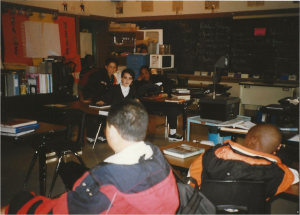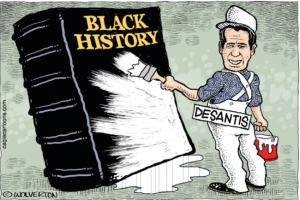Recent news about a ban on the AP African American History Curriculum has prompted a response.
Just2 Tutoring generally refrains from political discussion unless it directly impacts students and youth. The topic of AP African-American History directly impacts students and young people.
Teaching in San Francisco
I was a teacher at James Denman Middle School in San Francisco in the early nineties.
In my home state of Pennsylvania, neighborhoods were heterogeneous. As a kid, aside from Sesame Street, I rarely saw and never interacted with black and brown people.
Denman’s third floor overlooking the north slope of the South San Francisco hills was my assignment on August 10, 1993. The co-taught, self-contained, SIED classroom was the definition of diverse.
 My co-teacher Glenn and I provided all coursework for students from El Salvador, Nicaragua, Chile, Peru, and Burma (now Myanmar) in a single, mixed-grade level class period. Many of these students were new to the United States. Some only spoke in their native language. In contrast many of our African-American, Mexican, and Filipino students had lived in SF’s Excelsior District for generations.
My co-teacher Glenn and I provided all coursework for students from El Salvador, Nicaragua, Chile, Peru, and Burma (now Myanmar) in a single, mixed-grade level class period. Many of these students were new to the United States. Some only spoke in their native language. In contrast many of our African-American, Mexican, and Filipino students had lived in SF’s Excelsior District for generations.
We learned alot from each other, I like to think.
There were nearly weekly cultural celebrations of food, music, and dance at Denman. Many of these events were centered around a Latin-American or Asian tradition.
In 1993, Hip-hop was arguably in its prime. Black and brown kids had embraced their own modern culture. But, the music only occasionally echoed the empowering messages of Black Power Movements and great African-American leaders. Our African-American students lacked a connection with their past. Ironically, many were being raised by grandparents. They generally disregarded their foster or grandparents attempts to provide structure.
African American students have right to learn about their histories
I was far from knowledgeable on topics such as Jim Crow, Little Rock Nine, Emmet Till, Malcolm X, and Martin Luther King. Glenn lived in Oakland and was a former Black Panther. He had powerful messages for his students. Glenn would remind them often that the streets are designed to put black and brown people in jail. He told them often that “Jail is modern-day slavery”. This was no secret to our students; many of whom had one or both parents serving time in a California prison.
It was often our African-American students being escorted out for being disruptive when we gathered in the auditorium for a Cinco de Mayo celebration or the like. Some expressed to me that they felt no connection to the traditions of the Mexican people and that these assemblies were a waste of time.
What these kids and many others lacked was the right and opportunity to learn about themselves, and to experience a connection and empathy with cultures who have also faced intense adversity.
I knew that we could do better.
Fast forward to 2023 AP Africa-American History is under attack
Politico reported in late summer that “Florida Gov. Ron DeSantis announced that the state would bar public schools from participating in a pilot of the College Board’s new AP course on African American Studies”.
Aside from fear, there is no reason to ban a cultural curriculum. This ban bars access to education for both African-American students and students of other races who need to understand the events that shaped our history and created our modern political-cultural climate.
 I would ask Mr. DeSantis and other leaders, “Do you know who Emmet Till was?”, “Did your teachers cover the history of all American people or just those who owned land?”.
I would ask Mr. DeSantis and other leaders, “Do you know who Emmet Till was?”, “Did your teachers cover the history of all American people or just those who owned land?”.
History is written by the victors say some.
Ask questions.
Why would a democratically elected leader attempt to suppress an important part of our AP African-American History?



